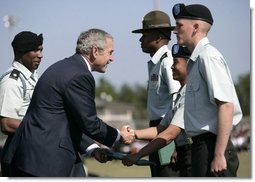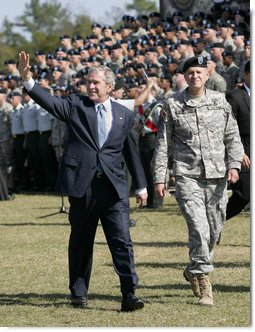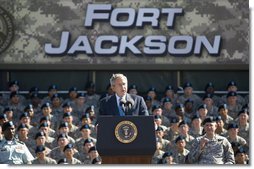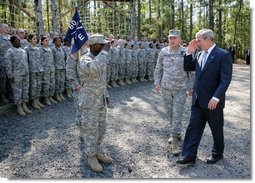| ||||||||||||||||||||||||||||||||||||||||||||||||||||||||||||||||||||||||||||||||||||||||||||||||||||||||||||||||||||||||||||||||
|
November 2, 2007 THE PRESIDENT: Colonel, thank you very much. I'm pleased to be here with you and to have a chance to say: "Hoo-ah!" AUDIENCE: Hoo-ah! THE PRESIDENT: I'm here to congratulate those of you who have completed your basic training. I thank -- thanks to your families for supporting these fine Americans. I want to thank those who have worked hard to train you. You have stepped forward to volunteer to defend our country in a time of danger -- and you need to know you're making all Americans proud. (Applause.)
You are part of a storied military tradition. Over the last century, Fort Jackson has prepared countless1 young Americans to defend our country. Soldiers marched from these fields to battle fascists2 and dictators and terrorists. Those soldiers brought freedom to millions of people they never knew. And because of their efforts, America is stronger, America is safer and America is free. (Applause.) Once again, our nation calls on brave Americans to confront our enemies and bring peace and security to millions -- and you're answering that call. I thank you for your courage. I thank you for making the noble decision to put on the uniform and to defend the United States of America in a time of war. (Applause.) Many of you will deploy3 to Iraq. You will help carry out a new strategy that, over the past few months, has taken the initiative from the enemy and driven them from key strongholds. Today I want to share with you, and the American people, some of the progress we are making in Iraq -- what we can expect in the months ahead. The fight for Iraq is critical to the security of the American people -- and with the skill and valor4 of the soldiers standing5 before me, standing beside me and standing behind me; it is a fight that we will win. (Applause.) I thank Lieutenant6 Colonel Cotton for his introduction and thank him for his service. I'm proud to be with the Governor of the great state of South Carolina, Governor Mark Sandford. (Applause.) With us today are members of the Congress, a United States senator and two members of the House of Representatives, who strongly support those who wear the uniform and their families: Senator Lindsey Graham, Congressman7 Joe Wilson and Congressman Bob Inglis. (Applause.) I thank General Schwitters for his hospitality and his leadership. I thank Command Sergeant8 Major Brian Carlson for his leadership. I thank all those who wear the uniform. It's incredible to be the Commander-in-Chief of a nation that has produced such bravery and such decency9 and such compassion10. We have the great -- the greatest military on the face of the earth, and we intend to keep it that way. (Applause.)
Today we face an enemy that is willing to kill the innocent to achieve their political objectives; an enemy that showed us the horrors they intend for us on September the 11th, 2001, when the terrorists murdered nearly 3,000 innocent souls on our own country. You know, it's a day I'll never forget, and it's a day our country should never forget. Some lessons that we must understand: First, conditions overseas matters to the security of the United States. When people live in hopeless societies, it's the only way that these evil perpetrators of violence can recruit. What matters overseas matters to the homeland. One of the lessons of September the 11th is we can't hope for the best. We must stay on the offense11. We must keep the pressure on the enemy. We must use all power of the United States to protect the American people from further home -- further harm, and that's what we're doing here today. (Applause.) And as we keep pressure on the enemy, we must always remember that the ultimate path to peace will come from the spread of freedom and liberty; that freedom is the great alternative to the ideology12 of the murderers and the radicals13; that -- but working help -- to work to help others become free, and our noble military is laying -- laying the foundation for peace for generations to come. And it is Iraq that is the central front in this struggle. In that country a democratic ally is fighting for its survival. Our enemies have sought to build safe havens14 there from which to plot further attacks against our people. And those who will be parading in front of us soon will be called upon to stop them. By taking the fight to the enemy in Iraq, we will defeat the terrorists there so we do not have to face them in the United States. (Applause.) America's new strategy to win that fight, including a surging U.N. forces -- U.S. forces has been fully15 operational for four months. I want to assure the loved ones here of something, and I want to assure those who wear the uniform of something: I will make decisions about our troop presence in Iraq and Afghanistan based upon the considered judgment16 of those who wear the uniform, not based upon the Gallup Poll or political party considerations. (Applause.)
Here's what I can report. First the challenges: Parts of Iraq continue to be violent and difficult. The terrorists are still capable of murdering the innocent -- that will get on our TV screens. The enemy remains determined, but what they have learned about the United States of America is we are more determined. We're more determined to protect ourselves and to help people realize the blessings of freedom. With our help the Iraqi people are going on the offense against the enemy. They're confronting the terrorists, and they're taking their country back. As part of our strategy, we sent forces into neighborhoods where Iraqis lived to rat out the extremists, to gain the confidence of the people. Together with Iraqi forces we have captured or killed an average of more than 1,500 enemy fighters per month since January of this year. (Applause.) Since the surge of operations began in June, the number of IED attacks per week has declined by half. U.S. military deaths have fallen to their lowest level in 19 months. Iraqi forces have now assumed responsibility for security in eight of Iraq's 18 provinces. Across this country brave Iraqis are increasingly taking more responsibility for their own security and safety. We're seeing some of the most dramatic changes in Anbar province. One year ago, many of the experts said Anbar had been lost to the enemy. As a matter of fact, at that time al Qaeda staged a parade in the city streets to flaunt its power and its control. Last week there was another parade in Anbar. This time it was a parade of Iraqi citizens and Iraqi forces who had reclaimed their homes and driven the terrorists out of their cities. And these changes were made possible by the bravery and determination of our Iraqi partners, and the incredible bravery of the men and women of the United States military. (Applause.)
The Iraqis are becoming more capable, and our military commander tells me that these gains are making possible what I call "return on success." That means we're slowly bringing some of our troops home -- and now we're doing it from a position of strength. Our new strategy recognizes that once Iraqis feel safe in their homes and neighborhoods they can begin to create jobs and opportunities. And that is starting to happen. There's some challenges: corruption remains a problem; unemployment remains high; and the improvements we are seeing in the Iraqi economy are not uniform across the country. But overall the Iraqi economy is growing at a strong rate. We're seeing improvements in important economic indicators. Inflation has been cut in half. Electricity production in September reached its highest levels since the war began -- and higher than it was under Saddam Hussein. Behind these numbers are stories of real people -- some of whom our troops may meet, in some real cities where you may patrol. In Baqubah, the historic market has been reopened in a city that had been in a virtual lockdown a few months ago. In Fallujah, workers have turned an artillery factory into a civilian machine shop employing 600 people. In the Baghdad neighborhood of Ameriya -- an al Qaeda stronghold until a few months ago -- locals have returned and are reopening their shops. Here's what this progress means to one shopkeeper in the former al Qaeda stronghold of Arab Jabour. He's a local butcher. He says that as recently as June, he was selling only one or two sheep per week. Now, the terrorists cleaned out and residents returning home, he's selling one or two sheep per day. Slowly but surely, the people of Iraq are reclaiming a normal society. You see, when Iraqis don't have to fear the terrorists, they have a chance to build better lives for themselves. You must understand an Iraqi mom wants her child to grow up in peace just like an American mom does. (Applause.) Our new strategy is based on the idea that improvements in security will help the Iraqis achieve national reconciliation. There's some challenges: reconciliation at the national level hasn't been what we hoped it'd been by now. While the central government has passed a budget, and has reached out to its neighbors, and begun to share oil revenues with the provinces, the Iraqi parliament still lags in passing key legislation. Political factions still are failing to make necessary compromises. And that's disappointing -- and I, of course, made my disappointments clear to Iraqi leadership. At the same time, reconciliation is taking place at the local level. Many Iraqis are seeing growing cooperation between Shia and Sunnis -- these folks are tired of al Qaeda and they're tired of Iranian-backed extremists, they're weary of fighting, and they are determined to give their families a better life. In Baghdad, Sunni and Shia leaders in one of the city's most divided neighborhoods recently signed an agreement to halt sectarian violence and end attack on coalition forces. In Anbar, Sunni sheikhs hosted Shia sheikhs from Karbala province to discuss security and express their unity. And I can assure you -- as can the soldiers who have been in Iraq -- that one year ago such an event was unthinkable. In Diyala province, tribal groups come together for the first time to foster reconciliation. I'm going to tell you a story of interest to me: Extremists had kidnapped a group of Sunni and Shia leaders from Diyala -- one of them was shot dead. According to a tribal spokesman, the extremists offered to release the Shia sheikhs, but not the Sunnis. And the Shias refused -- unless their Sunni brothers were released as well. The next day, most of the hostages were rescued, and their captors are now in custody. And the point I make is that given time and space, the normal Iraqi will take the necessary steps to put -- fight for a free society. After all, 12 million people voted for freedom -- 12 million people endorsed a democratic constitution. And it's in our interest we help them succeed. It's in our interest we help freedom prevail. It's in our interest we deny safe haven to killers who at one time killed us in America. It's in our interest to show the world that we've got the courage and the determination necessary to spread the foundation for peace, and that is what we're here to honor today. (Applause.) We're making progress, and many have contributed to the successes. And foremost among them are the men and women of the United States Army. Once again, American soldiers have shown the world why our military is the finest fighting force on earth. And now that legacy falls to the proud graduates today. Earlier generations of soldiers from Fort Jackson made their way to Europe and liberated a continent from tyranny. Today a new generation is following in their noble tradition. And one day people will speak of your achievements in Baqubah and Baghdad the way we now speak of Normandy and the Bulge. This post was named for a great American President. He served his country in two major conflicts, including the American Revolution at the age of 13. Andrew Jackson was renowned for his courage -- and that courage lives on at the base that bears his name. Troops from Fort Jackson have served with honor and distinction in today's war on terror -- and some have not lived to make the journey home. And today we honor their sacrifices. We pray for their families. We remember what they fought for -- and we pledge to finish the job. (Applause.) And you are the ones who will carry on their work. Americans are counting on you -- and their confidence is well placed. You've trained hard. You've prepared for battle. And when you take up your missions, you will give a new meaning to the slogan chanted by thousands of soldiers on this base in many wars and in many era: "Victory starts here." May God bless you all, and my God bless the United States of America. (Applause.) END 1:45 P.M. EDT 点击  收听单词发音 收听单词发音
|
||||||||||||||||||||||||||||||||||||||||||||||||||||||||||||||||||||||||||||||||||||||||||||||||||||||||||||||||||||||||||||||||
- 发表评论
-
- 最新评论 进入详细评论页>>

 Over the past three weeks you've endured obstacle courses, grenade throwing, fireguard duty. You even made it through Victory Forge. Now you have another tough assignment: You got to make it through my speech. (Laughter.)
Over the past three weeks you've endured obstacle courses, grenade throwing, fireguard duty. You even made it through Victory Forge. Now you have another tough assignment: You got to make it through my speech. (Laughter.)  It is a great day of celebration and I thank you for letting me come to celebrate with you. I know the moms and dads and family members are so proud of those who will be parading in front of us here in a minute. But it's also a time of war for our country. I wish I did not have to report that, but it's the truth; the way it is in this world in which we live. It's a moment when these soldiers prepare to assume responsibility for the security of our country and the safety of the free world.
It is a great day of celebration and I thank you for letting me come to celebrate with you. I know the moms and dads and family members are so proud of those who will be parading in front of us here in a minute. But it's also a time of war for our country. I wish I did not have to report that, but it's the truth; the way it is in this world in which we live. It's a moment when these soldiers prepare to assume responsibility for the security of our country and the safety of the free world.  So I accepted the recommendations of General David Petraeus, and I want to report to you on some of the results. Our new strategy emphasized securing the Iraqi population as the foundation for all other progress in that country.
So I accepted the recommendations of General David Petraeus, and I want to report to you on some of the results. Our new strategy emphasized securing the Iraqi population as the foundation for all other progress in that country.  Our enemies see the changes underway, and they increasingly fear they're on the wrong side of events. Osama bin Laden -- who has to hide in caves because the United States is on his tail -- understands, has said publicly that al Qaeda's recent setbacks are mistakes -- the result of mistakes that al Qaeda has made. In other words, he recognizes the inevitable -- that the United States of America and those who long for peace in Iraq, the Iraqi citizens, will not tolerate thugs and killers in their midst. (Applause.)
Our enemies see the changes underway, and they increasingly fear they're on the wrong side of events. Osama bin Laden -- who has to hide in caves because the United States is on his tail -- understands, has said publicly that al Qaeda's recent setbacks are mistakes -- the result of mistakes that al Qaeda has made. In other words, he recognizes the inevitable -- that the United States of America and those who long for peace in Iraq, the Iraqi citizens, will not tolerate thugs and killers in their midst. (Applause.) 

